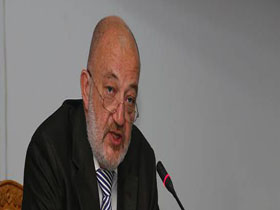Russian Ambassador in Dhaka Alexander A Nikolaev on Sunday said the Rooppur Nuclear Power Plant (NPP) is safe for Bangladesh saying those are opposing its construction have a wrong perception.
“I must tell you the reactor which is designed for Rooppur Nuclear Power Plant isn’t just safe enough, but is at least 10 times safer than Fukushima (Nuclear power plant) one,” he told a country lecture on ‘Russia in Modern International Policy’ in the city.
The envoy also said Russia successfully completed a ‘huge’ nuclear power plant in Bushehr, Iran just two years ago and has now been constructing more than 30 nuclear power plants with the similar design in many countries. “It’s sustainable not only against the earthquake but also against tsunami.”
The Russian diplomat came up with the remarks when he was asked whether Russia would take the responsibility if Fukushima nuclear plant disaster-like tragedy takes place in Bangladesh.
Under an agreement with the government, Russia’s state-owned nuclear power operator, Rosatom, will construct two units of the Rooppur NPP, each of 1,000 MW capacities.
Apparently expressing displeasure over German Ambassador Dr Albrecht Conze’s recent remark on Roopur power plant, Nikolaev said he does not know who told him (German envoy) about that and he (Russian envoy) could not understand what is the reason behind such position.
On March 16, Conze expressed concern over the government’s recent decisions to construct a coal-fired power plant not far from the Sundarbarns and a nuclear power plant near Pabna and said energy generation needs to take environmental risks into account.
Bangladesh Institute of International and Strategic Studies (BIISS) arranged the fifth round country lecture at its auditorium with its Chairman Munshi Faiz Ahmad in the chair. BIISS Director General SM Shafiuddin Ahmed also spoke on the occasion.
On bilateral trade between Bangladesh and Russia, Nikolaev said the two countries have the potential to increase the trade volume to US$ 1 billion which currently exceeds US$ 700 million.
He said the experience of more than four decades proves that there is nothing impossible in the areas of economic cooperation. “Everything is possible. I would like to stress it.”
The diplomat listed industrial joint ventures, offshore exploration and extraction, different types of joint ventures in other areas, collaboration in LNG (Liquefied Natural Gas) and compressed gas as the areas for future cooperation.
Responding to a question on defense purchase deal between Bangladesh-Russia, the envoy said, “Yes, it was an intergovernmental agreement signed on the 15th January 2013 regarding Russia’s state loan to Bangladesh for military cargo aircraft purchase. That’s true.”
He said both sides have completed placing order for purchasing military cargo aircraft including combat aircraft.
On January 15 last year, Dhaka and Moscow signed a $1 billion deal under which Bangladesh would procure military equipment and arms from Russia.
On Crimea issue, he said a referendum was held in Crimea on March 16 in full compliance with democratic procedures and international norms.
More than 82 percent of the electorate took part in the vote. Over 96 percent of them spoke out in favour of reuniting with Russia. These numbers speak for themselves, the diplomat said quoting the Russian President.
Asked whether Russia is flexing its muscle, Nikolaev said, “Not at all. It’s very direct and honest answer. Russia isn’t flexing its muscles. Russia is concentrating on its own interest.”
He also said the days for unipolar world are over and Russia supports multipolar world.
The envoy also talked about Russia’s engagement with Bangladesh in various fields, particularly in energy sector, and focused various aspects related to Russia’s international policy and its relation with Bangladesh.
He noted that Russia developed a very good relation with Bangladesh from the very first day of the country as an independent state and assisted to restore and develop the war-ravaged country.
The diplomat mentioned that the cooperation between Bangladesh and Russia has always been ‘very comprehensive’.
He said Russia and Bangladesh share common approaches to ideas of multipolar world architecture and fair economic system.
Scholars, members of academia and policymakers participated in the open discussion sessions.
Source: UNBConnect









